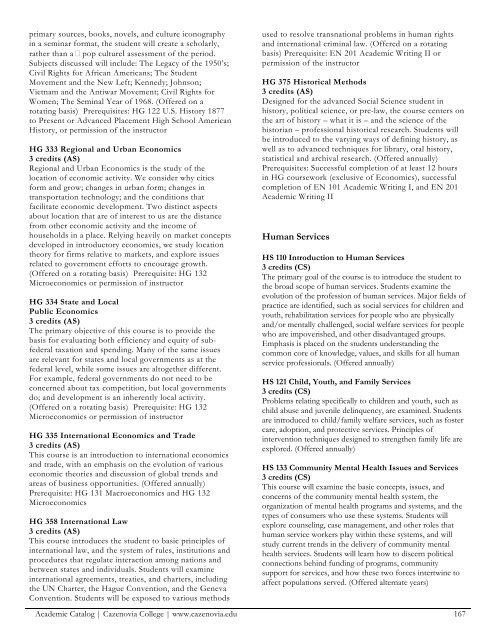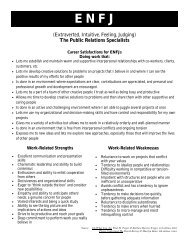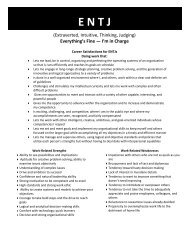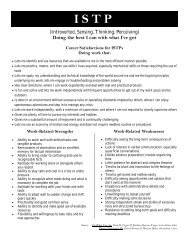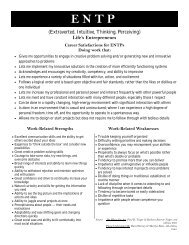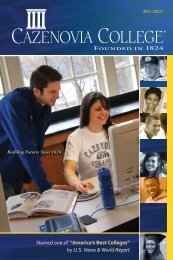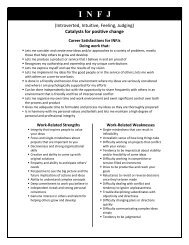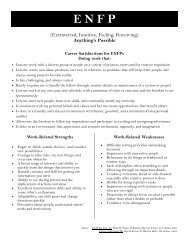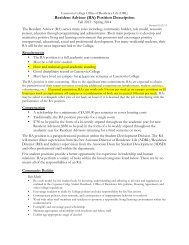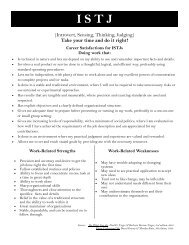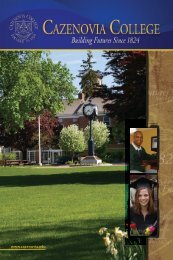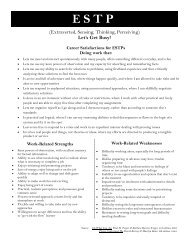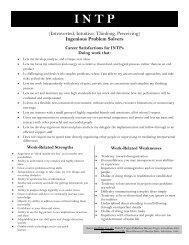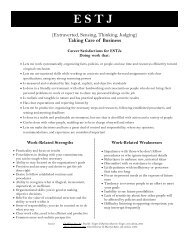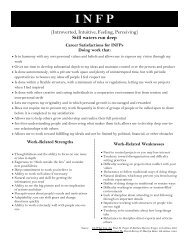of
2013-14 Academic Catalog - Cazenovia College
2013-14 Academic Catalog - Cazenovia College
- No tags were found...
Create successful ePaper yourself
Turn your PDF publications into a flip-book with our unique Google optimized e-Paper software.
primary sources, books, novels, and culture iconography<br />
in a seminar format, the student will create a scholarly,<br />
rather than a pop cultureǁ‖ assessment <strong>of</strong> the period.<br />
Subjects discussed will include: The Legacy <strong>of</strong> the 1950’s;<br />
Civil Rights for African Americans; The Student<br />
Movement and the New Left; Kennedy; Johnson;<br />
Vietnam and the Antiwar Movement; Civil Rights for<br />
Women; The Seminal Year <strong>of</strong> 1968. (Offered on a<br />
rotating basis) Prerequisites: HG 122 U.S. History 1877<br />
to Present or Advanced Placement High School American<br />
History, or permission <strong>of</strong> the instructor<br />
HG 333 Regional and Urban Economics<br />
3 credits (AS)<br />
Regional and Urban Economics is the study <strong>of</strong> the<br />
location <strong>of</strong> economic activity. We consider why cities<br />
form and grow; changes in urban form; changes in<br />
transportation technology; and the conditions that<br />
facilitate economic development. Two distinct aspects<br />
about location that are <strong>of</strong> interest to us are the distance<br />
from other economic activity and the income <strong>of</strong><br />
households in a place. Relying heavily on market concepts<br />
developed in introductory economics, we study location<br />
theory for firms relative to markets, and explore issues<br />
related to government efforts to encourage growth.<br />
(Offered on a rotating basis) Prerequisite: HG 132<br />
Microeconomics or permission <strong>of</strong> instructor<br />
HG 334 State and Local<br />
Public Economics<br />
3 credits (AS)<br />
The primary objective <strong>of</strong> this course is to provide the<br />
basis for evaluating both efficiency and equity <strong>of</strong> subfederal<br />
taxation and spending. Many <strong>of</strong> the same issues<br />
are relevant for states and local governments as at the<br />
federal level, while some issues are altogether different.<br />
For example, federal governments do not need to be<br />
concerned about tax competition, but local governments<br />
do; and development is an inherently local activity.<br />
(Offered on a rotating basis) Prerequisite: HG 132<br />
Microeconomics or permission <strong>of</strong> instructor<br />
HG 335 International Economics and Trade<br />
3 credits (AS)<br />
This course is an introduction to international economics<br />
and trade, with an emphasis on the evolution <strong>of</strong> various<br />
economic theories and discussion <strong>of</strong> global trends and<br />
areas <strong>of</strong> business opportunities. (Offered annually)<br />
Prerequisite: HG 131 Macroeconomics and HG 132<br />
Microeconomics<br />
HG 358 International Law<br />
3 credits (AS)<br />
This course introduces the student to basic principles <strong>of</strong><br />
international law, and the system <strong>of</strong> rules, institutions and<br />
procedures that regulate interaction among nations and<br />
between states and individuals. Students will examine<br />
international agreements, treaties, and charters, including<br />
the UN Charter, the Hague Convention, and the Geneva<br />
Convention. Students will be exposed to various methods<br />
used to resolve transnational problems in human rights<br />
and international criminal law. (Offered on a rotating<br />
basis) Prerequisite: EN 201 Academic Writing II or<br />
permission <strong>of</strong> the instructor<br />
HG 375 Historical Methods<br />
3 credits (AS)<br />
Designed for the advanced Social Science student in<br />
history, political science, or pre-law, the course centers on<br />
the art <strong>of</strong> history – what it is – and the science <strong>of</strong> the<br />
historian – pr<strong>of</strong>essional historical research. Students will<br />
be introduced to the varying ways <strong>of</strong> defining history, as<br />
well as to advanced techniques for library, oral history,<br />
statistical and archival research. (Offered annually)<br />
Prerequisites: Successful completion <strong>of</strong> at least 12 hours<br />
in HG coursework (exclusive <strong>of</strong> Economics), successful<br />
completion <strong>of</strong> EN 101 Academic Writing I, and EN 201<br />
Academic Writing II<br />
Human Services<br />
HS 110 Introduction to Human Services<br />
3 credits (CS)<br />
The primary goal <strong>of</strong> the course is to introduce the student to<br />
the broad scope <strong>of</strong> human services. Students examine the<br />
evolution <strong>of</strong> the pr<strong>of</strong>ession <strong>of</strong> human services. Major fields <strong>of</strong><br />
practice are identified, such as social services for children and<br />
youth, rehabilitation services for people who are physically<br />
and/or mentally challenged, social welfare services for people<br />
who are impoverished, and other disadvantaged groups.<br />
Emphasis is placed on the students understanding the<br />
common core <strong>of</strong> knowledge, values, and skills for all human<br />
service pr<strong>of</strong>essionals. (Offered annually)<br />
HS 121 Child, Youth, and Family Services<br />
3 credits (CS)<br />
Problems relating specifically to children and youth, such as<br />
child abuse and juvenile delinquency, are examined. Students<br />
are introduced to child/family welfare services, such as foster<br />
care, adoption, and protective services. Principles <strong>of</strong><br />
intervention techniques designed to strengthen family life are<br />
explored. (Offered annually)<br />
HS 133 Community Mental Health Issues and Services<br />
3 credits (CS)<br />
This course will examine the basic concepts, issues, and<br />
concerns <strong>of</strong> the community mental health system, the<br />
organization <strong>of</strong> mental health programs and systems, and the<br />
types <strong>of</strong> consumers who use these systems. Students will<br />
explore counseling, case management, and other roles that<br />
human service workers play within these systems, and will<br />
study current trends in the delivery <strong>of</strong> community mental<br />
health services. Students will learn how to discern political<br />
connections behind funding <strong>of</strong> programs, community<br />
support for services, and how these two forces intertwine to<br />
affect populations served. (Offered alternate years)<br />
Academic Catalog | Cazenovia College | www.cazenovia.edu 167


